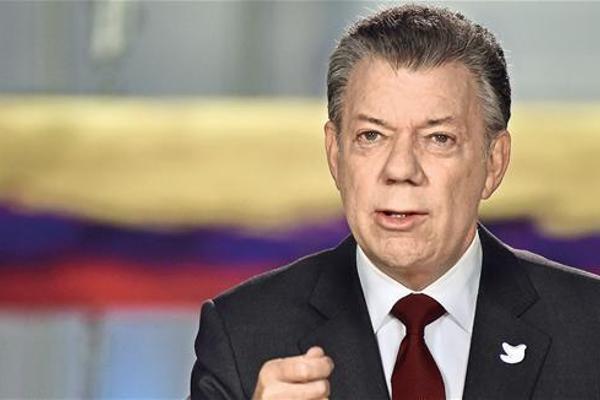Colombia, FARC rebels to sign new peace deal on Nov 24
BOGOTA – Reuters


The revised document will be signed in Bogota between FARC leader Rodrigo Londono and Santos, who won the Nobel Peace Prize last month for his efforts to end the conflict with the insurgent group.
“We have the unique opportunity to close this painful chapter in our history that has bereaved and afflicted millions of Colombians for half a century,” the president said in a televised address.
The government and the Revolutionary Armed Forces of Colombia (FARC) have been in talks in Havana, Cuba for the last four years, hammering out a deal to end a conflict that has killed more than 220,000 and displaced millions in the Andean country.
The government published the revised peace deal last week in a bid to build support after the original draft was rejected in an Oct. 2 referendum amid objections it was too favorable to the rebels.
Santos and Londono signed the original deal two months ago in an emotional ceremony before world leaders and United Nations Secretary-General Ban Ki-moon.
The decision to ratify the revised accord in Congress instead of holding another referendum will anger members of the opposition, particularly former President Alvaro Uribe who spearheaded the push to reject the original accord and wants deeper changes to the new version.
The government holds a majority in the legislature.
“This new accord possibly won’t satisfy everybody, but that’s what happens in peace accords. There are always critical voices; it is understandable and respectable,” said Santos, 65, warning another plebiscite could divide the nation and put in danger the bilateral cease-fire.
The expanded and highly technical 310-page document appears to make only small modifications to the original text, such as clarifying private property rights and detailing more fully how the rebels would be confined in rural areas for crimes committed during the war.
Uribe has criticized it as just a slightly altered version of the original and wants rebel leaders to be banned from holding public office and for them to be jailed for crimes.
The FARC, which began as a rebellion fighting rural poverty, has battled a dozen governments as well as right-wing paramilitary groups.
An end to the war with the FARC is unlikely to end violence in Colombia as the lucrative cocaine business has given rise to dangerous criminal gangs and traffickers.
“We have the unique opportunity to close this painful chapter in our history that has bereaved and afflicted millions of Colombians for half a century,” the president said in a televised address.
The government and the Revolutionary Armed Forces of Colombia (FARC) have been in talks in Havana, Cuba for the last four years, hammering out a deal to end a conflict that has killed more than 220,000 and displaced millions in the Andean country.
The government published the revised peace deal last week in a bid to build support after the original draft was rejected in an Oct. 2 referendum amid objections it was too favorable to the rebels.
Santos and Londono signed the original deal two months ago in an emotional ceremony before world leaders and United Nations Secretary-General Ban Ki-moon.
The decision to ratify the revised accord in Congress instead of holding another referendum will anger members of the opposition, particularly former President Alvaro Uribe who spearheaded the push to reject the original accord and wants deeper changes to the new version.
The government holds a majority in the legislature.
“This new accord possibly won’t satisfy everybody, but that’s what happens in peace accords. There are always critical voices; it is understandable and respectable,” said Santos, 65, warning another plebiscite could divide the nation and put in danger the bilateral cease-fire.
The expanded and highly technical 310-page document appears to make only small modifications to the original text, such as clarifying private property rights and detailing more fully how the rebels would be confined in rural areas for crimes committed during the war.
Uribe has criticized it as just a slightly altered version of the original and wants rebel leaders to be banned from holding public office and for them to be jailed for crimes.
The FARC, which began as a rebellion fighting rural poverty, has battled a dozen governments as well as right-wing paramilitary groups.
An end to the war with the FARC is unlikely to end violence in Colombia as the lucrative cocaine business has given rise to dangerous criminal gangs and traffickers.
